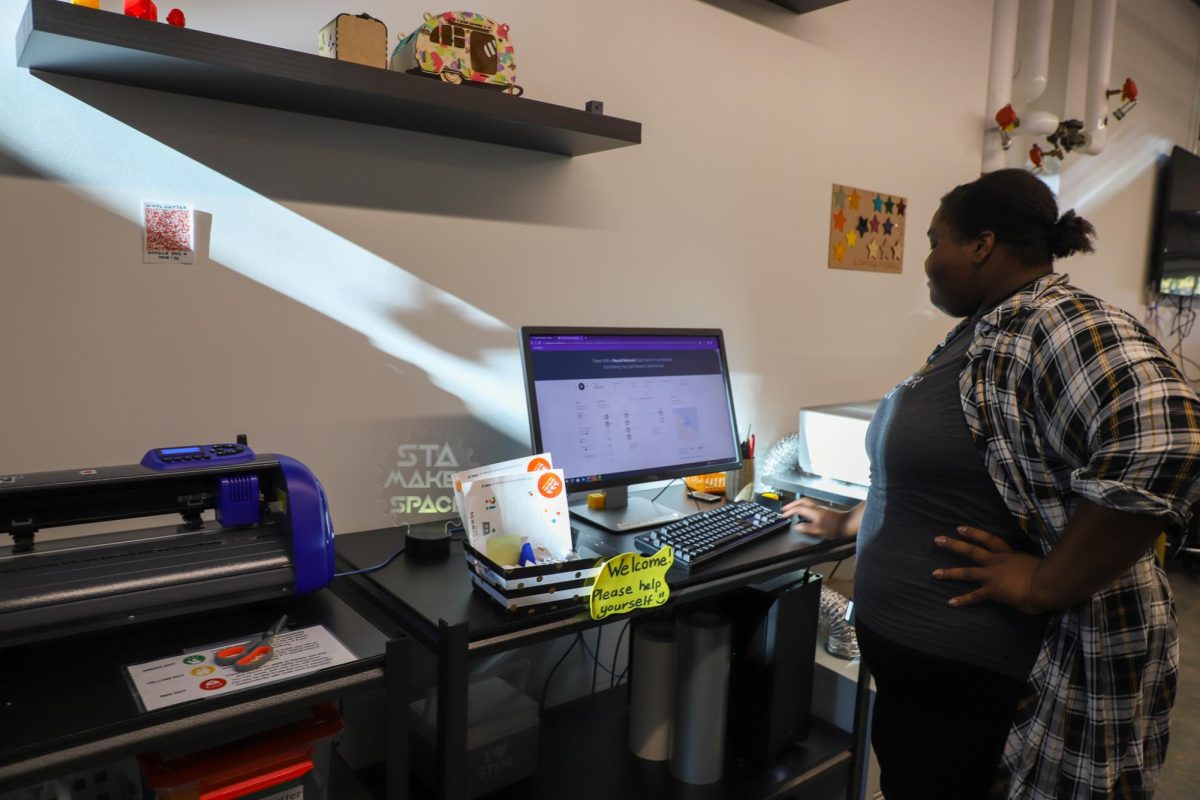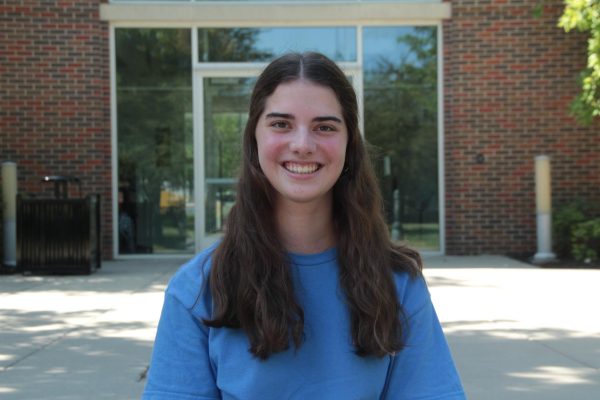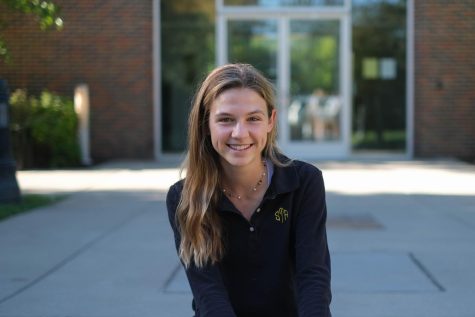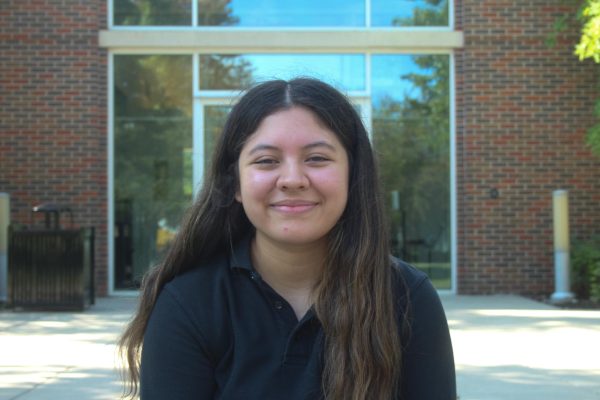The global phenomenon of artificial intelligence is rapidly shifting the way educators and students view learning. The growing presence of AI can be felt on the STA campus this fall, as administration and teachers have adapted to the new technology.
STA has begun familiarizing students with AI through the creation of a Nearpod assignment geared towards teaching the basics of ChatGPT. STA Network and Systems Administrator Jeff Zimmerman, who crafted the assignment, believes instructing students on the basics of AI is part of STA’s role in preparing and empowering young women for their life beyond high school.
“AI is your future and it is not going to go away,” Zimmerman said. “If anything, it will only grow in usability and integration into your day-to-day lives. And quickly. We feel that teaching STA students how to both understand and use it responsibly is better than pretending it doesn’t exist.”
The Nearpod includes videos and prompts to guide students’ through a brief history of AI, its limitations, and the correct way to use it. Principle of Student Affairs Liz Baker took the Nearpod to educate herself on this emerging technology, and highly recommends it to anyone interested in gaining a deeper understanding of AI.
“Mr. Zimmerman has done a great job in his research and presentation and talking about the history and about how it works and also speaking about prompting,” Baker said. “I think that if somebody takes that and studies it very well, they’ll do well with it.”
Senior Megan Turley helped teach an AI-centered course over the summer and she is familiar with the applications. She recommends that students educate themselves before using AI.
“Students should try to learn about it [AI] from people who regularly use it or have helped develop it,” Turley said. “There’s not a lot of technical knowledge needed to use AI. It’s more of being very aware of what you’re doing.”
The introduction of AI has left many on campus worried that it will take away from the students’ learning experience. Baker considers the social implications of AI to be the most pressing aspect of adapting to the new technology.
“My greatest concern, as a disciplinarian, is on social media, what’s real and what isn’t, and how is that affecting the psyche of my students. That’s probably my biggest concern, or being able to manipulate the speech of somebody, so if you get accused of saying something on social media, I’m not going to be able to know, is that AI or is that real.”
Alternatively, Turley warns peers of the academic consequences associated with unethical use of AI, especially when students lack a complete understanding of the technology.
“Sometimes there is a danger in trying to cheat using AI because it has ‘hallucinations,’ which means that AI basically makes up information that it might not actually know,” Turley said. “Students need to be careful and need to know exactly what they’re looking for.”
The greatest concern for most when hearing that AI will be installed on student devices is the temptation to cheat on schoolwork. While AI is encouraged to be used as a writing aid, English Teacher Sarah Taber notes that it is not ethical to use AI applications to write essays in place of students doing the work. She stresses that this can be viewed as plagiarism and takes away from the student’s learning experience.
“That makes me sad because I feel like it’s [AI] taking away from a student’s capability to sort of fulfill her full potential,” Taber said.
Zimmerman believes the key to managing this new tool is providing students with the skills and cognizance necessary to use it beneficially.
“I don’t think it is any different than other resources that have been available to students,” Zimmerman said. “Like most tools, there are both good and bad ways to use them. Knowing how to use the tool is the key to mastering and understanding it.”
Computer and Engineering Science teacher Lillia Nelson also believes the new technology is manageable, as teachers can typically identify ChatGPT usage based on their knowledge of students’ previous abilities. According to Nelson, gaining the skills necessary to use AI are essential to avoid academic dishonesty.
“We understand what the average student is capable of. If it seems a little complex of an analysis, we can easily assume that you probably got some help and honestly, that’s OK. But teaching students how to properly use AI to come up with prompts to help in your idea development process, and then you take it from there and you do further research. That is good, you know, good digital citizenship.”
Teachers are helping to combat students’ misuse of AI through incorporating it into their classes. As a teacher in the English department, Taber expressed how AI has changed some aspects of teaching.
“I think it can be an incredibly important tool that we can utilize and regulate. I feel like we need to start seeing how it can improve our writing or improve our content without letting it replace what we’re doing,” Taber said.
Baker emphasized the importance of collaboration between teachers and students, especially as the technology and our understanding of it evolves.
“I think we’re all on the same page in the sense that it’s brand new,” Baker said. “We’re all working on [AI] together as students and teachers and that’s a good thing. I think it could really help teaching and learning, if somebody is really involved in it and can really embrace and learn about it. So that from the teacher’s side and the students’ side, working together in collaboration to create something that is a really good product.
Turley has seen the benefits of AI through her own classroom experiences.
“AI will help students study more,” Turley said. “I have used it to make study guides and also used it to help write outlines for my essays.”
Teachers ultimately agree that the use of AI is a complex and ever-changing process. They urge students to not be afraid of it, but rather educate themselves about what it is and how it can be used in their everyday life in a helpful and useful way. Rather than living in fear, Taber encourages remaining curious and learning about the different ways AI can be implemented into students’ lives.
“AI has the potential to make us better humans,” Taber said. “It’s here, and so instead of ignoring it and letting it just be used for nefarious purposes, I’d rather face it, use it and try to make us better.”
Seeing students educate themselves on and debate the issues surrounding AI gives Nelson hope for the future.
“Just seeing and hearing students’ passion in regards to these issues, it definitely shakes my fear of the future away,” Nelson said. “These kids can be president. Listening to them arguing and debating with evidence and passion is wonderful. We actually have students that put thought into their futures, their careers and how technology impacts that in the lives of others around them.”







